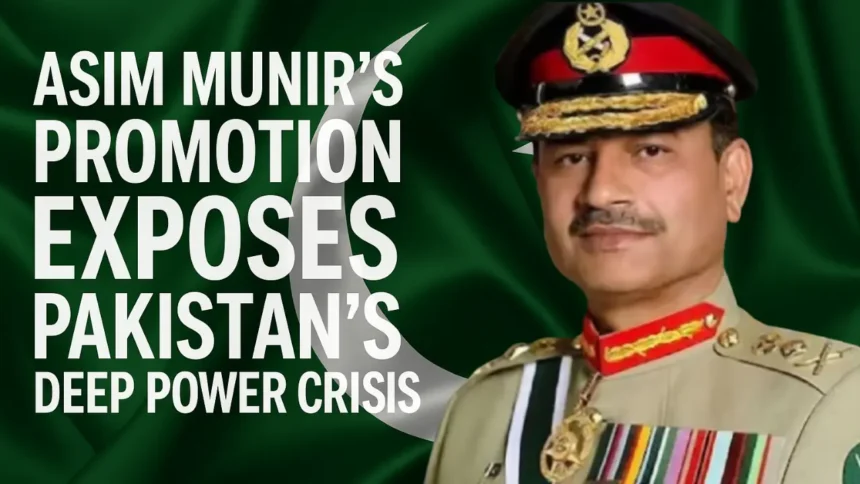Asim Munir’s Promotion: A Turning Point in Pakistan’s Power Structure
A Rank Too High?
In a nation where democracy has long teetered on fragile legs, the promotion of General Asim Munir to Field Marshal has sent political shockwaves through Pakistan. It’s a title so rare that only one man before him—Ayub Khan—held it. But this isn’t just a ceremonial honor; it’s a loud, unmistakable statement that the military still calls the shots in Pakistan.
With this move, Pakistan’s already thin line between civil and military authority has blurred further. Many are asking: What does this mean for Pakistan’s democracy, governance, and future?
The Weight of the Title: Why It Matters
Becoming a Field Marshal isn’t a routine military career step. It’s the highest rank in the army, and in Pakistan’s case, a highly symbolic gesture. Unlike most global militaries where such promotions reflect ceremonial recognition, in Pakistan, it signals consolidation of unchecked power.
For General Asim Munir, this promotion means:
- Lifetime immunity from scrutiny—both during service and post-retirement.
- Unquestioned command over not just military affairs but also indirect influence over civilian governance.
- A legacy positioning him above future generals, politicians, and judicial oversight.
This isn’t just a military promotion—it’s a political chess move.
Ayub Khan Déjà Vu: A Dangerous Precedent?
The last time Pakistan promoted someone to Field Marshal, it ended with Ayub Khan installing himself as the country’s first military dictator. His era was marked by:
- A military-bureaucratic elite replacing democratic institutions
- Media censorship and political suppression
- A foreign policy driven solely by military interests
Fast-forward to 2025, and Pakistan seems to be walking the same tightrope. If history teaches us anything, it’s that such promotions are rarely symbolic in Pakistan—they’re often preludes to a larger political power play.
Civilian Government: Powerless on Paper?
Prime Minister Shehbaz Sharif and his fragile coalition are in office, but not in power. The country’s political leaders may be visible at press conferences, but it’s the GHQ in Rawalpindi that writes the actual script.
With Asim Munir’s elevation:
- The civilian government is further weakened, reduced to a ceremonial front.
- Policy decisions—from foreign affairs to economic bailouts—may now be more overtly dictated by the military.
- Elected representatives risk becoming rubber stamps, with no real say in Pakistan’s future.
This move cements the military’s position not just as the “guardian” of the state, but its undisputed ruler.
Behind the Scenes: Why Now?
This promotion didn’t come in isolation. It follows months of:
- Political instability post-Imran Khan’s ouster
- Widespread protests, economic crises, and public dissatisfaction
- A judiciary under pressure to align with the state’s narrative
General Munir has often been seen as a strategist behind Imran Khan’s political fall, and now, this elevation ensures that no court or commission can challenge his past or future actions.
Simply put, this is a reward for loyalty to the establishment and a guarantee of future insulation from accountability.
What This Means for Democracy
Let’s call it what it is: a demotion of democracy.
- Journalists fear reprisal
- Activists are jailed or silenced
- Social media platforms face state-imposed throttling
- Civil-military dialogue has become a monologue
The power imbalance is no longer subtle—it’s been institutionalized.
Pakistan’s democratic dream, already riddled with compromises, now faces an even darker and uncertain future. Will any prime minister ever govern freely under the shadow of such a powerful Field Marshal?
Public Sentiment: Mixed, but Muzzled
While some in Pakistan, particularly within the establishment, hail this as a move to stabilize the country, the public mood is far from celebratory.
Whispers on social media suggest:
- Fear of another military takeover
- Concerns over press freedom
- Worry about foreign policy shifts and loss of global trust
But censorship ensures most dissent remains invisible. What’s more terrifying than losing your voice? Being forced to pretend you still have it.
Global Reactions: Watching Closely
International observers—especially in the U.S., EU, and neighboring India—are viewing this development with caution. Why?
- It raises concerns about Pakistan’s democratic trajectory
- It complicates diplomatic engagement, especially with civilian leaders sidelined
- It undermines trust in Pakistan’s legal and constitutional processes
Asim Munir’s Elevation: India Watches Closely, But Stands Strong
India views Asim Munir’s promotion to Field Marshal as a clear signal of Pakistan’s internal instability, where democracy weakens under the shadow of military supremacy. With Munir’s rise, civilian institutions in Pakistan risk becoming ceremonial, further deepening the governance crisis.
In contrast, India’s democratic strength under Prime Minister Modi’s leadership stands tall—marked by strategic clarity, decisive policymaking, and strong national security measures. While Pakistan grapples with military overreach, India remains focused, alert, and diplomatically firm, ready to counter any provocation with resilience and restraint.
Munir’s rise may shake Pakistan—but not a self-assured, well-governed India.
Final Thoughts: A Promotion Pakistan Can’t Afford?
In times of economic despair, social unrest, and global isolation, Pakistan needed unity and reform. Instead, it has doubled down on military supremacy.
The question remains: Can democracy breathe in a nation where medals matter more than mandates?
General Asim Munir may have gained stars on his shoulders, but the nation bears the weight of silence and fear.
Want to stay informed about the real power shifts shaping South Asia?
Subscribe to our newsletter and join the conversation.
Share this article with your friends to spark awareness.
Let’s keep the truth alive—even when it’s uncomfortable.
Most read: https://tnheadlines24.com/india-fired-at-pakistan-over-terror/
Disclaimer: The views and opinions expressed in this article are those of the author and do not necessarily reflect the official policy or position of TN HEADLINES24. All information is based on publicly available sources and intended for informational purposes only. TN HEADLINES24 is not responsible for any inaccuracies, misinterpretations, or actions taken based on the content provided.




